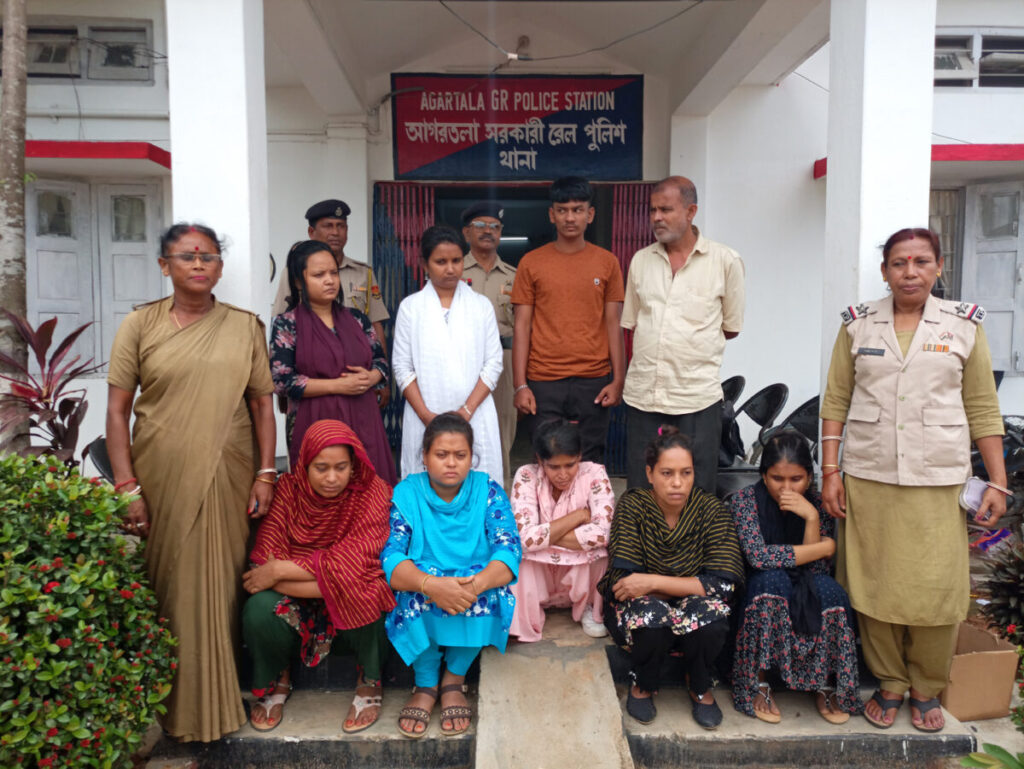The Agartala Railway Police recently apprehended eight Bangladeshi nationals along with one Indian citizen for attempting to illegally cross the border into India. The incident underscores the complexities surrounding border security and the persistent efforts of law enforcement agencies to curb unauthorized movements across international boundaries.
The incident unfolded near the Indo-Bangladesh border in Agartala, the capital city of Tripura, a northeastern state sharing a porous border with Bangladesh. Acting on a tip-off, the Agartala Railway Police launched a surveillance operation along the railway tracks, a common route used by individuals attempting to enter India clandestinely. During the operation, the police intercepted a group of nine individuals comprising eight Bangladeshi nationals and one Indian citizen who were attempting to cross the border illegally.
According to preliminary investigations, the apprehended individuals revealed that they were attempting to enter India in search of better economic opportunities and livelihood prospects. Many individuals from Bangladesh, which shares a long and porous border with India, often seek to cross into Indian territory in search of employment, education, or asylum. However, such attempts are fraught with risks and often involve illegal means of entry, including crossing rivers, forests, or railway tracks.
The apprehension of the nine individuals by the Agartala Railway Police underscores the importance of vigilant border surveillance and enforcement measures to prevent unauthorized movements across international boundaries. The porous nature of the Indo-Bangladesh border poses significant challenges for border security agencies, who must contend with issues such as human trafficking, smuggling, and illegal migration on a regular basis. Effective border management requires a multifaceted approach involving coordination between various agencies, deployment of modern surveillance technology, and cooperation with neighboring countries.
Furthermore, the incident highlights the socio-economic factors driving cross-border migration and the underlying reasons why individuals risk their lives to seek entry into a foreign country. Poverty, lack of opportunities, political instability, and environmental degradation are among the factors driving people to leave their home countries in search of better prospects elsewhere. Addressing the root causes of migration requires concerted efforts by governments to create conducive conditions for economic growth, social development, and political stability.
In response to the incident, the Agartala Railway Police have initiated legal proceedings against the apprehended individuals for illegally crossing the border and violating immigration laws. The Indian citizen among the group has been charged with aiding and abetting illegal migration, while the Bangladeshi nationals are likely to be handed over to the Border Security Force (BSF) for further investigation and deportation. Such stringent enforcement measures send a strong message to potential migrants about the consequences of attempting to enter the country illegally.
Moreover, the incident underscores the importance of maintaining robust border security infrastructure and enhancing cooperation with neighboring countries to address transnational security threats. India and Bangladesh share a long history of bilateral cooperation on border management, including the exchange of intelligence, joint patrolling, and coordinated efforts to combat cross-border crime. Strengthening these mechanisms is essential for effectively addressing the challenges posed by illegal migration and other security concerns along the Indo-Bangladesh border.
In addition, the apprehension of nine individuals by the Agartala Railway Police for attempting to illegally cross the Indo-Bangladesh border underscores the persistent challenges of border security and illegal migration faced by countries around the world. The incident highlights the need for enhanced border surveillance, enforcement measures, and international cooperation to address the root causes of migration and prevent unauthorized movements across international boundaries. As countries grapple with the complexities of managing migration flows, collaboration and coordination between governments, law enforcement agencies, and civil society organizations are essential for ensuring border security and upholding the rule of law.


